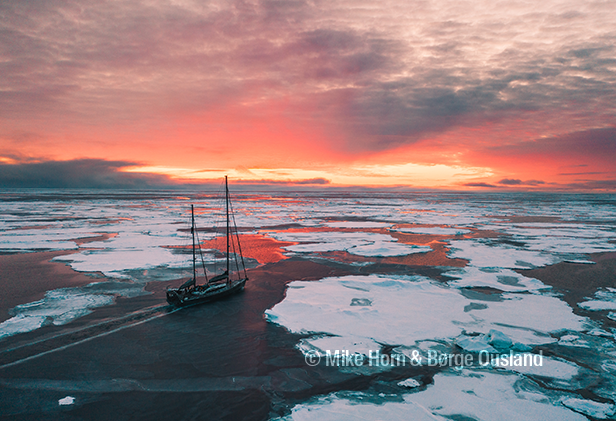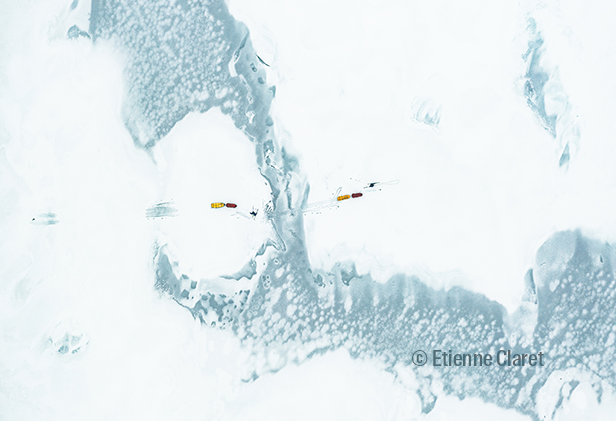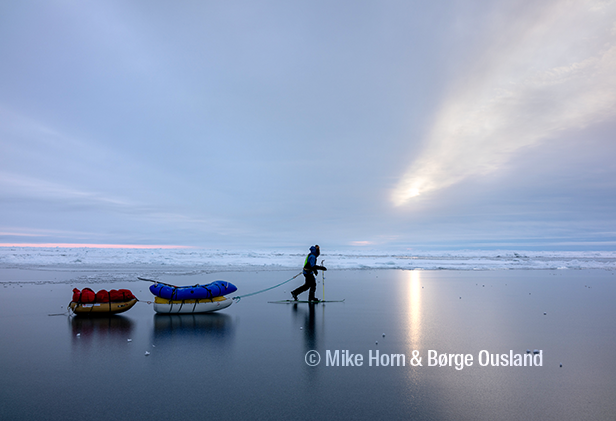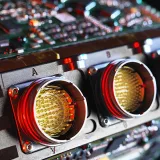Mike Horn, the extreme adventurer
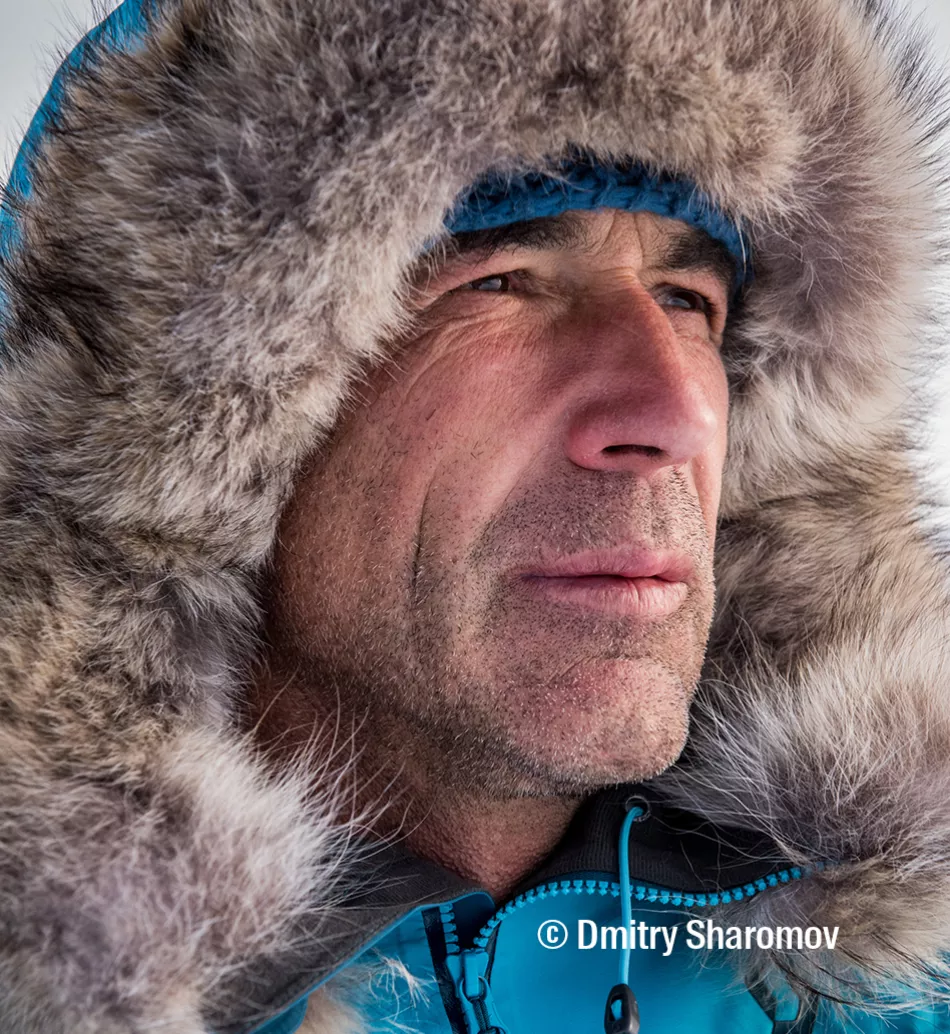
Mike Horn and LEMO have both earned a global reputation thanks to their relentless conquest of the planet’s harshest conditions. Then, one day, their paths crossed in the deserts of Saudi Arabia.
Hydrospeeding 6700 km on the Amazon river. Travelling around the equator or the Arctic Circle –alone with no motorized transport. 60-day skiing to the North Pole in permanent darkness with only one companion. North-South crossing of Antarctica in 57 days on kite-skis… Mike Horn continues a long line of firsts and feats, cementing his reputation of “ the greatest adventurer of our times ”. The 54-year-old South-African (naturalised Swiss) seems to be unstoppable. We managed to make him sit down on a couch (after having had our hand crushed and arm torn by way of a greeting) and make him tell us about his quest.
Why choose wilderness rather than normal life ?
Mike Horn : I do not really oppose the two – I do not think that we live in nature, but that nature lives inside of us. Besides, I go on an expedition like others go to work. I have been doing this for nearly thirty years and once I managed to sleep only 32 nights in my bed, over a period of five years. My normal life is on expedition. Home does not even mean holidays, but only a clean change of underwear ! (chuckles)
Why do you prefer harsh environments ?
Adventures attract me. I love doing things that no one had done before, because I must go without a guide and write the story for myself. The more you challenge the unknown, the more you re-evaluate your needs. You realise that you can do without a car or a house, friends, social life and sex… up until the moment when there is only one thing you really need : staying alive. It is then that I have the feeling of being truly alive. It is then that my life makes most sense and that I feel happy.
Does facing danger and death make it stronger ?
Obviously, if I make a mistake on the ice floe, I do not have a second chance, I die. However, I do not do this to die, but to live.
It is a form of personal development then…
Having to adapt, to evolve means growing. You do not grow if you stay in your comfort zone, where you know and control everything. Also, you naturally try to go further when you are happy with what you are doing. This is why I can never refuse a new adventure – ascending 8000 m, sailing or, more recently, rally racing (see inset). I discover, learn and grow.
Is it not to flee from mankind ?
No, but it is true that I hate social pressure that makes us do things that we do not like. I do not tell others how to live, so they should not tell me how I should. When I am alone in my tent on the Arctic Circle with an outside temperature of -50
You coach athletes and others to help them succeed with their projects… What advice do you give them ?
I think the first step is to dream big. If you believe that you can be the first person to cross the Arctic in the dark, it is already a first step towards success. Having big dreams is motivating, it gives us courage and pushes us to leave our comfort zone that we are trapped in out of fear of failure. Sometimes, you must tell yourself : “ Shake up, raise your head, for goodness’ sake ! Move on, don’t be a coward ! ” This is when my expeditions speak to all : we all have moments of doubt that we must overcome.
Technology also helps men to push back their limits… what kind of equipment do you take on an expedition ?
Technology cannot be eaten, so we measure it to the gramme. It is often custom made for me because it must be extremely resistant. For example, sometimes I spend several weeks at -30°C or -40°C, when liquid crystal displays freeze as of -18°C. My technology is limited to light and communication. I take Petzl low energy headlights with high-power diodes. I also take GPS, communication material designed by partners such as Speedcast: satellite telephones, WiFi modems as well as material to charge them – silicon cables, connectors, batteries designed for military and aerospace applications… This way I can send photos and e-mails to share what I live through – 62 million people followed our crossing the North Pole. We depend entirely on technology as far as communications are concerned. For the rest, I try to avoid it.
How come ?
One must be able to stay alive without technology, just in case… I can navigate without GPS, based on the hour, the position of stars and the direction of winds. This gives a feeling of security. During expeditions, you gradually acquire knowledge and experience, you learn faster than the evolution of gadgets. It helps to succeed, all by myself, in things always a little bigger and harder.
One thing you have been sharing is the observation of climatic change…
I return regularly to the same places – the Amazon, the Poles – so, yes, I saw them evolve indeed. Some birds arrive in the Arctic and stay much longer ; polar bears drown swimming between ice floes too distant from one another ; or have to fight against grizzlies, which they have never encountered before ; avalanches are more frequent ; enormous sheets of ice get detached ; the permafrost has eroded by 10 meters; glaciers recede. Or, in the Amazon, the rainforest keeps shrinking. When you observe these changes in less than 30 years – only a second in the planet’s history – there is enough to worry about.
By the way, you are sometimes criticized because you take a helicopter or a four-wheel drive car or because your TV broadcast requires transporting a lot of heavy material…
Yeah. [shakes his head] There are always critiques like this, often from people who live in comfort and go to work every day by car… as for myself, as soon as the helicopter, shared with a scientific mission, dropped me off, I did not consume anything more for weeks. No car, no television, no lights, no fridge. Nothing. People should focus on reducing - albeit a little – their own ecological footprint, before looking at others,
Committed to a cleaner dakar rally
Mike Horn had already been familiar with the LEMO brand, which had equipped his TV broadcast equipment used on extreme terrain. But it was in January 2020, that he met it personally in Saudi Arabia, since the CEO Alexandre Pesci, like Mike, run his first Dakar Rally there. The two Swiss nationals instantly connected and over a fondue the conversation flowed.
The adventurer participated in the rally as coach to the Red Bull Junior team and co-driver of the accompanying car driven by Cyril Desprès, five-time Dakar motorcycle champion. This participation, so different from his usual solitary non-motorised adventures, provoked a flow of on-line vitriol. The adventurer countered by teaming up with Cyril Desprès in the Gen-Z project : to run the 2023 Dakar Rally onboard a zero-emission vehicle. They are not the first to do so (electric motorcycles have participated and there are other hydrogen- fuelled vehicle projects), but the challenge is exciting.
The Gen-Z car will be developed by Vaison Sport, a specialist in the design of race car prototypes. For the batteries, the two companions have convinced the French Atomic and Alternative Energy commission (CEA) to support their Gen-Z project. The requirements, quite far from those equipping hydrogen-fuelled production vehicles, made the institution hesitate. “ After three months’ thinking, they came up with a solution for batteries of over 300 kW providing the equivalent of 400 HP. Brilliant ! ”
Last January, Horn and Desprès ran Dakar 2021 in a Peugeot DKR buggy packed with sensors. The recorded data will accelerate the development process of the Gen-Z vehicle and its hydrogen engine. Dakar 2022 next January will be the trial run. And, in 2023, they will run to win. To silence the critics, but “ first of all, to contribute to making the Dakar Rally more modern and less polluting ”, promises Mike Horn.
